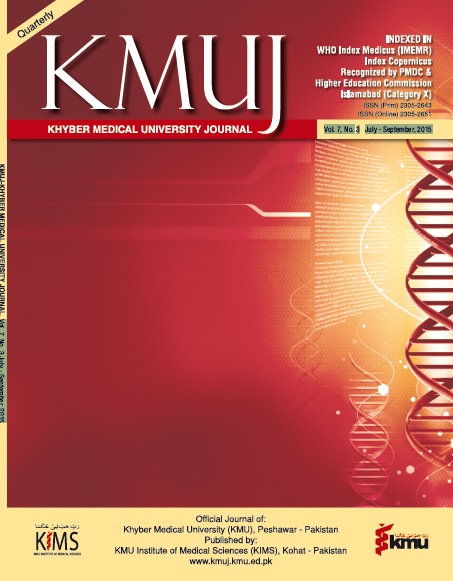GAPS IN THE DOCUMENTATION OF HEPATITIS-C TESTS AT A TEACHING HOSPITAL IN KHYBER PAKHTUNKHWA, PAKISTAN
Main Article Content
Abstract
OBJECTIVE: To assess the record documentation and gaps in the record keeping of data regarding hepatitis-C virus (HCV) infected patients in a teaching hospital of Khyber Pakhtunkwa Pakistan.
METHODS: This cross sectional study was conducted from January to February 2015, on secondary data obtained from the previous five years laboratory record of a purposively selected teaching hospital in the central districts of Khyber Pakhtunkhwa. Name of the hospital is kept confidential but research findings will be shared with the concerned medical superintendent. A pre designed check list was used to collect information from the available record. Descriptive statistics and figures were obtained using MS Excel 2007.
RESULTS: Out of 120133 tests performed for HCV during those five years, 4019 (3.3%) were positive. Mean of all tests performed per month was 2002+1231.17 while mean of positive tests per month was 66.98+49.70. An overall upward trend was observed for HCV tests performed while positive tests showed fluctuation. However the record keeping of the data was poor and data recorded was deficient in terms of reproducibility. Data of three months in 2010 and 2 months in 2011 was missing.
CONCLUSION: Information recorded about HCV suspects and confirmed cases are insufficient and needs improvement.
KEY WORDS: Hepatitis C (MeSH), Documentation (MeSH), Teaching hospital (MeSH)
Article Details
Work published in KMUJ is licensed under a
Creative Commons Attribution 4.0 License
Authors are permitted and encouraged to post their work online (e.g., in institutional repositories or on their website) prior to and during the submission process, as it can lead to productive exchanges, as well as earlier and greater citation of published work.
(e.g., in institutional repositories or on their website) prior to and during the submission process, as it can lead to productive exchanges, as well as earlier and greater citation of published work.
References
Sharafi H, Alavian SM, Keshvari M. Efficacy
of 24-Week Pegylated Interferon Alpha
and Ribavirin Combination Therapy in
Highly Selected Patients Infected With
Hepatitis C Virus Genotype 1. Hepat
Mon 2015; 15 (1): e24955. doi: 10.5812/
hepatmon. 24955
Basit A, Rahim K, Ahmad I, Shafiq M,
Mushtaq S, Shaheen H, et al . Prevalence
of hepatitis B and C infection in Pakistan.
J Inf Mol Biol 2014; 2 (3): 35-8.
Maticic M, Zorman JV, Gregorcic S, Schatz
E, Lazarus JV. Are there national strategies,
plans and guidelines for the treatment of
hepatitis C in people who inject drugs? A
survey of 33 European countries. BMC
Infectious Diseases 2014; 14 (Suppl 6):
S14. doi:10.1186/1471-2334-14-S6-S14.
Bosan A, Qureshi H, Bile KM, Ahmed I,
Hafiz R. A review of hepatitis viral infections
in Pakistan. J Pak Med Assoc 2010;
(12): 1045-58.
Ujjan I, Aurangzeb M, Memon RA, Memon
ZY. Prevalence of Hepatitis B Virus (HBV)
in association of Hepatitis Delta Virus
(HDV). Med Chennal 2012; 4: 53–57.
Lavanchy D. Evolving epidemiology of
Hepatitis C virus. Clin Microbial Infect
; 17: 107–15.
Farhat M, Yasmeen A, Ahmad A. An overview
of hepatitis B and C in Pakistan. Int J
Microbiol Allied Sci 2014; 1 (2): 98–102.
Ashraf S, Ahmad A. Viral hepatitis in Pakistan:
challenges and priorities. Asian Pac J
Trop Biomed 2015; 5 (3): 190–91.
Qureshi H, Mohamud BK, Alam SE, Arif
A, Ahmed W. Treatment of hepatitis B and
C through national programme-an audit. J
Pak Med Assoc 2013; 63: 220-4.
Ali M, HorikoshiY. Situation analysis of
health management information system
in Pakistan. Pak J Med Res 2002; 41: 64–9.
Ali M, Hotta M, Kuroiwa C, Ushijima H.
Emergency obstetric care in Pakistan:
Potential for reduced maternal mortality
through basic EmOC facilities, services
and access. Int J Gynecol Obstet 2005:
: 105–12.
Fauveau V, Donnay F. Can the process
indicators for emergency obstetric care
assess the progress of maternal mortality
reduction programs? An examination of
UNFPA Projects 2000-2004. Int J Gynecol
Obstet 2006; 93: 308–16.
Aziz S, Rao MH. Existing record keeping
system in government teaching hospitals
of Karachi. J Pak Med Assoc 2002; 52:
–74.
Ali M, Kuroiwa C. Accurate record
keeping in referral hospitals in Pakistan’s
North West Frontier Province and Punjab:
a crucial step needed to improve maternal
health. J Pak Med Assoc 2007; 57: 443–46.
Huffman E. Manual for medical record
librarians. 4th edn. Berwyn, Illinois: Physician’s
Company 1960; pp 31–160.
McCullough CM, Wang JJ, Parsons AS,
Shih SC. Quality Measure Performance
in Small Practices Before and After Electronic
Health Record Adoption. eGEMs
; 3 (1): 1–11. DOI: http://dx.doi.
org/10.13063/2327-9214.1131.
Sinard JH, Castellani WJ, Wilkerson ML,
Henricks WH. Stand-alone Laboratory
Information Systems Versus Laboratory
Modules Incorporated in the Electronic
Health Record. Arch Pathol Lab Med 2015;
: 311–18.
